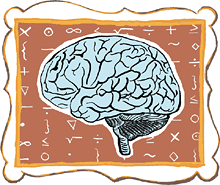Do the Math: The Importance of Making Friends with Numbers
Why choose mathematics in high school? Here’s why.

Despite the availability of well-paid jobs in fields such as engineering, statistics, and technology, many students do not take enough math courses. They see it as hard, boring, and irrelevant -- not true. Here are twelve excellent reasons to learn math:
It makes you smarter.
Math is to learning what endurance and strength training is to sports: the means to excel in the specialty of your choice. You can't become a major sports star without being strong and having good cardiovascular ability. You can't become a star in any profession unless you can think smart and critically. Math will help you do that.
You'll make more money.
Winners of American Idol and other celebrities may win big bucks, but they are few and far between. If you skip auditions and instead do your homework -- especially in math -- you can go on to get an education that will get you a well-paid job. You can earn more than what pop singers and sports stars make -- perhaps not right away, but over a lifetime.
You'll lose less money.
When hordes of idiots throw their money at pyramid schemes, it is partially because they don't know enough math. If you know a little bit about statistics and interest calculations, you can see through economic lies and wishful thinking.
You'll have an easier time at college.
Yes, it is hard work to learn math properly while in high school. But when it's time for college, you can skip reading pages and pages of boring, overly explained texts. Instead, you can look at a chart or a formula and understand how things relate. Math is a language, more concise and effective than other ones. If you know math, you can work smarter, not harder.
You'll live in a global world.
You will compete for interesting jobs against people from the whole world -- and the smart kids in China, India, and eastern Europe regard math and other "hard" sciences as a ticket out of poverty and social degradation. Do as they do: Obtain knowledge that makes you viable all over the world, not just in your home country.
You'll live in a world of constant change.
New technology and ways of doing things change life and work daily. If you have learned math, you can discover how and why things work, and avoid scraping by through your career, supported by Post-it Notes and Help files, scared to death of accidentally pressing the wrong key and running into something unfamiliar.
It doesn't close any doors.
If you don't choose math in high school, you close the door to interesting studies and careers. You might not think those options are interesting now, but what if you change your mind? Besides, math is most easily learned when you're young, whereas the social sciences, history, art, and philosophy benefit from a little maturing.
It's interesting.
Too many people -- including teachers -- will tell you that math is hard and boring. What do they know? You don't ask your grandmother which game console you should get, and you don't ask your parents for help in sending a text message. Why ask if math is hard? If you do the work and stick it out, you will find that math is fun, exciting, and intellectually elegant.
You'll meet it more and more in the future.
In the future, journalists and politicians will talk less and analyze more. Police officers and military personnel will use ever more complicated technology. Nurses and teachers will have to relate to numbers and technology every day. Car mechanics and carpenters will use chip optimization and stress analysis as much as wrenches and hammers.
You can get through, not just into, college.
Even if you cherry-pick the easy stuff in high school, you'll be eligible for college. Having a diploma is nice, but don't think it makes you ready for higher education. You will notice this as soon as you enter college and have to take remedial math programs, with ensuing stress and difficulty.
It's creative.
Many people think math has to do only with logical deduction and somehow is in opposition to creativity. The truth is that math can be a supremely creative force if the knowledge is used correctly, not just as a tool for problem solving during your career.
It's cool.
You have permission to be smart; you have permission to do what your peers do not. Choose math so you don't have to, for the rest of your life, talk about how math is hard. Choose math so you don't have to joke away your inability to do simple calculations. Besides, math will get you a job in the cool companies, the ones that need brains.
Credit: Sasha Wizansky